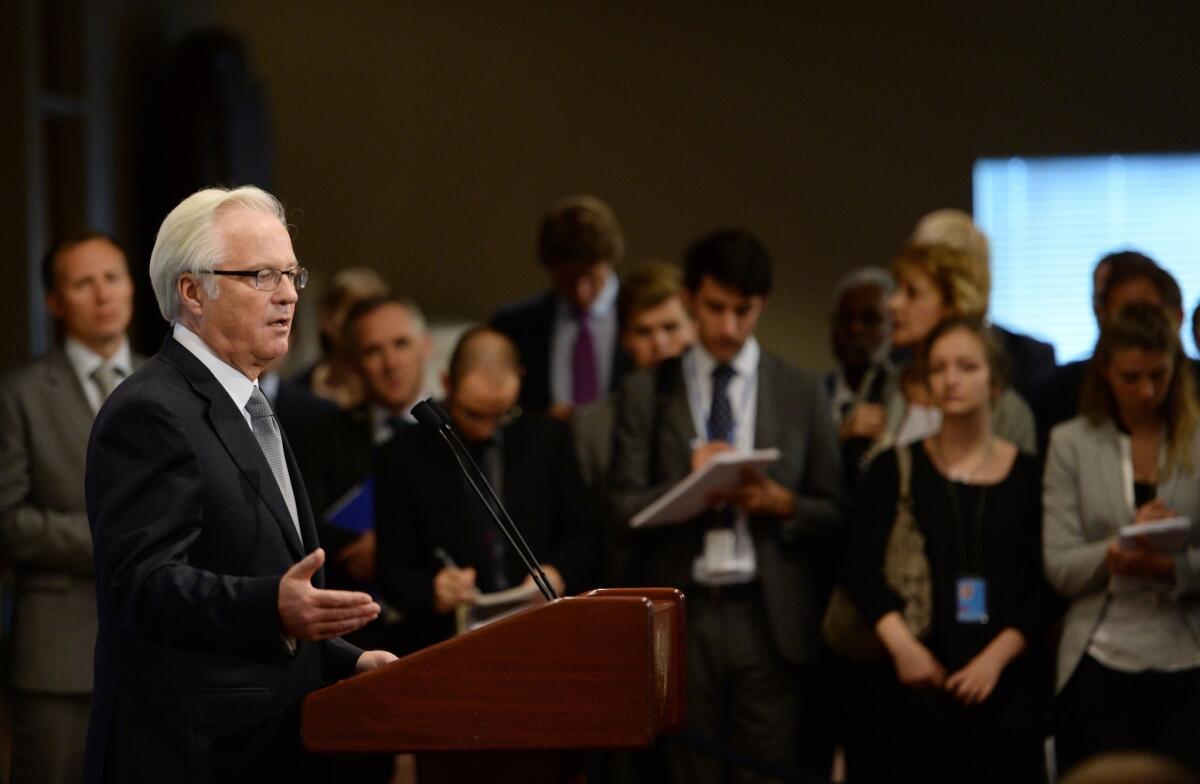U.N. probe confirms Syrian chemical weapons use: Now the hard part

- Share via
With its unsurprising confirmation that chemical weapons have been used in Syria, the United Nations’ report Monday that an Aug. 21 attack in the Damascus suburbs involved sarin gas has been met with a consistent global reaction: Now what?
The report compiled by U.N. weapons inspectors and presented to the Security Council by Secretary-General Ban Ki-moon provided extensive technical and forensic evidence of bombardment with sarin gas carried by surface-to-surface rockets.
Western diplomats and human rights groups were quick to claim that only the government of Syrian President Bashar Assad is known to have rockets of the type retrieved from the attack site and found during laboratory analysis to have traces of sarin.
DOCUMENT: U.N. report on chemical weapons use in Syria
In one photograph of a rocket remnant included in the inspectors’ report, the Cyrillic letter for the “sh” sound was visible on the metal casing.
But Ban declined to answer reporters’ questions on whether the apparent Russian markings on some of the rocket fragments suggested the weapons were used by Assad, a major arms client of Russia. Ban said the mandate given the inspection team didn’t call for an assessment of blame, just a determination of whether banned chemical agents were used.
The U.S., British and Australian ambassadors to the United Nations stated unequivocally that the inspectors’ findings as to the launch sites, quantity of sarin used and type of rocket all pointed to Assad.
The report “confirms, in our view, that there is no remaining doubt that it was the regime that used chemical weapons,” said Gary Quinlan, Australia’s U.N. envoy, who holds the Security Council’s rotating presidency this month.
The investigators’ report may do little to spur concerted action by the Security Council, where Russia and China have already invoked their veto power among the five permanent member states to block previous attempts to censure Assad. Russia is Syria’s most powerful ally, and China opposes international actions that seek to punish states for human rights abuses, something it considers a matter of domestic concern.
U.S. Secretary of State John F. Kerry and Russian Foreign Minister Sergei Lavrov announced agreement Saturday on a plan to get Syria to surrender its chemical arsenal for destruction by mid-2014. The joint “framework” agreement follows Moscow’s success in getting the Assad regime to concede for the first time last week that it has chemical weapons stockpiles and to agree to abide by the Chemical Weapons Convention, a 1993 treaty signed by all U.N. member nations except Syria, North Korea, Angola, Egypt and South Sudan.
But Kerry and Lavrov were already issuing contradictory statements Monday as to the wording and enforcement powers needed in a U.N. Security Council resolution to govern Syria’s handover of its chemical weapons. Kerry, backed by Britain and France, said during a meeting with allied diplomats in Paris that the directive must include a credible threat of force in the event Syria equivocates or attempts to hide some of its chemical stockpile. Lavrov denied agreeing to any punitive military action should Assad renege on his pledge to give up the stores of poison gas and nerve agents.
Ban expressed the hope that the Security Council would take action quickly and work with the Organization for the Prohibition of Chemical Weapons to design a program for taking control of Syria’s weapons-grade chemicals -- said to exceed 1,000 tons -- and keeping an eye on the weapons until they can be destroyed.
The OPCW, based in The Hague, is the implementing authority for the Chemical Weapons Convention. Its director general, Ahmet Uzumcu, has deemed the U.S.-Russian plan for ridding Syria of chemical weapons a “historic challenge” and, like Ban, conceded the task is rife with complexities and potential pitfalls.
Uzumcu strongly condemned the proven use of chemical weapons in Syria and said the inspectors’ report “makes it all the more important to ensure that the program for chemical demilitarization in Syria succeeds.”
Syria will join the convention on Oct. 14, becoming the 190th member state of the treaty, noted Uzumcu, who is Turkish. His organization would be responsible for carrying out the daunting logistics of containment and destruction, the first such mission the chemical arms experts will be conducting in a country only reluctantly joining the convention and in the midst of a civil war.
Those challenges may be eclipsed, though, by expected disputes and rival agendas of the five Security Council permanent members as they strive to put together a cohesive resolution and disarmament mandate.
At his meeting in Paris with French and British counterparts, Kerry urged the U.S. allies to keep the threat of airstrikes against Assad on the table to ensure he doesn’t backtrack from his pledge to give up his illegal weapons.
“If the Assad regime believes this is not enforceable and we are not serious, they will play games,” Kerry warned as he wrapped up a weeklong European diplomatic mission. “We’re going to work hard to have a resolution that is as strong and forceful as possible.”
French Foreign Minister Laurent Fabius said the three Western allies demand that the disarmament plan and the U.N. resolution defining it require “concrete, verifiable acts” by Damascus. To ensure that, he concluded, “all options must stay on the table if things are not done.”
ALSO:
Turkey says it shot down Syrian helicopter in tense border region
South Korean troops shoot, kill man trying to cross to North Korea
At least 2 killed, 260,000 evacuated as Typhoon Man-yi lashes Japan
A foreign correspondent for 25 years, Carol J. Williams traveled to and reported from more than 80 countries in Europe, Asia, the Middle East and Latin America.
More to Read
Sign up for Essential California
The most important California stories and recommendations in your inbox every morning.
You may occasionally receive promotional content from the Los Angeles Times.











